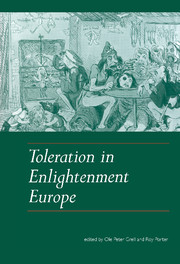Book contents
- Frontmatter
- Contents
- List of contributors
- Preface
- 1 Toleration in Enlightenment Europe
- 2 Toleration and the Enlightenment Movement
- 3 Multiculturalism and Ethnic Cleansing in the Enlightenment
- 4 Intolerance, the Virtue of Princes and Radicals
- 5 Spinoza, Locke and the Enlightenment Battle for Toleration
- 6 Toleration and Enlightenment in the Dutch Republic
- 7 Toleration and Citizenship in Enlightenment England: John Toland and the Naturalization of the Jews, 1714–1753
- 8 Citizenship and Religious Toleration in France
- 9 A Tolerant Society? Religious Toleration in the Holy Roman Empire, 1648–1806
- 10 Enlightenment in the Habsburg Monarchy: History of a Belated and Short-Lived Phenomenon
- 11 Toleration in Eastern Europe: the Dissident Question in Eighteenth-Century Poland–Lithuania
- 12 Toleration in Enlightenment Italy
- 13 Inquisition, Tolerance and Liberty in Eighteenth-Century Spain
- Index
11 - Toleration in Eastern Europe: the Dissident Question in Eighteenth-Century Poland–Lithuania
Published online by Cambridge University Press: 03 February 2010
- Frontmatter
- Contents
- List of contributors
- Preface
- 1 Toleration in Enlightenment Europe
- 2 Toleration and the Enlightenment Movement
- 3 Multiculturalism and Ethnic Cleansing in the Enlightenment
- 4 Intolerance, the Virtue of Princes and Radicals
- 5 Spinoza, Locke and the Enlightenment Battle for Toleration
- 6 Toleration and Enlightenment in the Dutch Republic
- 7 Toleration and Citizenship in Enlightenment England: John Toland and the Naturalization of the Jews, 1714–1753
- 8 Citizenship and Religious Toleration in France
- 9 A Tolerant Society? Religious Toleration in the Holy Roman Empire, 1648–1806
- 10 Enlightenment in the Habsburg Monarchy: History of a Belated and Short-Lived Phenomenon
- 11 Toleration in Eastern Europe: the Dissident Question in Eighteenth-Century Poland–Lithuania
- 12 Toleration in Enlightenment Italy
- 13 Inquisition, Tolerance and Liberty in Eighteenth-Century Spain
- Index
Summary
Even admirers of eighteenth-century Poland and its last king Stanislaw August Poniatowski, such as the French historian Jean Fabre, have agreed that, in terms of religious tolerance, the Polish–Lithuanian Commonwealth was among the nations which most radically rejected the concept of modernity. At a time when almost everywhere in Europe, including Russia, the idea of freedom of belief took root as one of the commonly shared values of the Enlightenment, in Poland religious emotions seemed to run higher than ever before. In the course of the eighteenth century, the Republic of Nobles ultimately abandoned its own tradition of constitutionally asserted religious tolerance as established in the famous Warsaw Confederation of 1573 and embarked instead on implementing, and stubbornly defending, a concept of nobilitarian nationhood that firmly linked the idea of citizenship to the Catholic faith. It could therefore not be denied, as Fabre argued, that not least the nobilitarian nation itself was to be held responsible for the catastrophe that ended in the first partition of Poland in 1772. Quite legitimately Catherine II and Frederick II could claim that by intervening on behalf of the persecuted Polish dissidents the partitioning powers had defended the principles of the philosophes – even though the intervention led to what otherwise was to be considered an act of arbitrary and barbarian violation of international law and the rights of nations.
The very fact that religious toleration in Poland–Lithuania had been in steady decline ever since the early seventeenth century is beyond question.
- Type
- Chapter
- Information
- Toleration in Enlightenment Europe , pp. 212 - 229Publisher: Cambridge University PressPrint publication year: 1999



